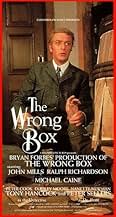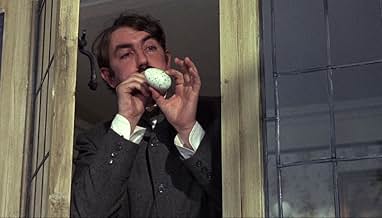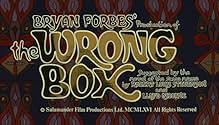AVALIAÇÃO DA IMDb
6,7/10
4,2 mil
SUA AVALIAÇÃO
Adicionar um enredo no seu idiomaIn Victorian England, a fortune now depends on which of two brothers outlives the other, or can be made to have seemed to do so.In Victorian England, a fortune now depends on which of two brothers outlives the other, or can be made to have seemed to do so.In Victorian England, a fortune now depends on which of two brothers outlives the other, or can be made to have seemed to do so.
- Direção
- Roteiristas
- Artistas
- Ganhou 1 prêmio BAFTA
- 1 vitória e 2 indicações no total
Avaliações em destaque
Robert Louis Stevenson wrote novels that studied character and its flaws: Long John Silver in "Treasure Island", Aleck Breck Stewart in "Kidnapped" and "David Balfour", James and Henry Durie in "The Master Of Ballentrae", Dr. Henry Jeckyll/Mr. Edward Hyde.... His best novels show the ambiguity of character. Yet with his interest in melodramatics he should have been a natural for writing mystery and detective stories, like his contemporaries Conan Doyle, Gilbert Chesterton, and Ernest Brahmah. They concentrated their gifts on character developments on their central story figures (Holmes and Watson, Father Brown, Max Carrados), but the basic plot development is what pulls the story along for all of them. Stevenson pulled the story plot to develop the characters instead.
Except once - "The Wrong Box". It is Stevenson's spoof on mystery and detective fiction. It was not his novel alone, but the first of three he wrote with his stepson Lloyd Osborne (to whom he told the story of "Treasure Island" before he wrote it down). Stevenson is telling the story of Masterman and Joseph Finsbury, the last two survivors of a special type of insurance form called a "tontine". It's an elaborate wager where a bunch of people put up a sum of money individually, and the last survivor gets the bulk of it. Masterman is home bound, and Joseph is a lively old bore who loves to talk and show off his preposterous knowledge of trivia (Ralph Richardson brings out the fact about the word "whip" when riding with a man holding a "whip"). Masterman (John Mills) lives with his grandson Michael (Michael Caine), and Joseph with his two greedy nephews (Morris and John - Peter Cook and Dudley Moore) and his niece Julia (Nanette Newman). Joseph does not really care about the tontine, but Masterman wants it - and is willing to speed the demise of Joseph to do it. Morris and John have to keep Joseph alive (which is not unlikely - he is in good health). Michael is not quite sure what is going on with his irascible grandfather, and Julia just knows she dislikes her two cousins Morris and John (but she really likes Michael). So the stage is set for the comedy. Along the way we meet other characters who are colorful: Dr. Pratt (Peter Sellers) - who at the drop of a hat will tell you about how he fell from medical grace to the backstreet he resides in; Peacock (Wilfred Lawson), Masterman's butler, who makes the average turtle look like it's turbocharged; the police Detective (Tony Hancock) - who can't put together a coherent idea if his life depended on it; and ...the Bournmouth Strangler (the story is from 1888, so we can guess who this character is based on).
It is a marvelous send-up on Victorian England, taking in the empire (notice the beginning when we see the demises of various members of the tontine), to the problems of railway traffic, talkative relatives, and body disposal in London in the 1880s. That the novel is not quite like the film does not matter (Michael is not a medical student but a clever barrister in the story, and John's relationship with Morris deteriorates in the story due to some money troubles), but this does not matter. It is a fun movie and well worth seeing.
Except once - "The Wrong Box". It is Stevenson's spoof on mystery and detective fiction. It was not his novel alone, but the first of three he wrote with his stepson Lloyd Osborne (to whom he told the story of "Treasure Island" before he wrote it down). Stevenson is telling the story of Masterman and Joseph Finsbury, the last two survivors of a special type of insurance form called a "tontine". It's an elaborate wager where a bunch of people put up a sum of money individually, and the last survivor gets the bulk of it. Masterman is home bound, and Joseph is a lively old bore who loves to talk and show off his preposterous knowledge of trivia (Ralph Richardson brings out the fact about the word "whip" when riding with a man holding a "whip"). Masterman (John Mills) lives with his grandson Michael (Michael Caine), and Joseph with his two greedy nephews (Morris and John - Peter Cook and Dudley Moore) and his niece Julia (Nanette Newman). Joseph does not really care about the tontine, but Masterman wants it - and is willing to speed the demise of Joseph to do it. Morris and John have to keep Joseph alive (which is not unlikely - he is in good health). Michael is not quite sure what is going on with his irascible grandfather, and Julia just knows she dislikes her two cousins Morris and John (but she really likes Michael). So the stage is set for the comedy. Along the way we meet other characters who are colorful: Dr. Pratt (Peter Sellers) - who at the drop of a hat will tell you about how he fell from medical grace to the backstreet he resides in; Peacock (Wilfred Lawson), Masterman's butler, who makes the average turtle look like it's turbocharged; the police Detective (Tony Hancock) - who can't put together a coherent idea if his life depended on it; and ...the Bournmouth Strangler (the story is from 1888, so we can guess who this character is based on).
It is a marvelous send-up on Victorian England, taking in the empire (notice the beginning when we see the demises of various members of the tontine), to the problems of railway traffic, talkative relatives, and body disposal in London in the 1880s. That the novel is not quite like the film does not matter (Michael is not a medical student but a clever barrister in the story, and John's relationship with Morris deteriorates in the story due to some money troubles), but this does not matter. It is a fun movie and well worth seeing.
In my considered opinion, this is one of the best British comedies of all time (and I flatter myself that I am not usually given to hyperbole). To buttress this opinion, I could mention the fact that the movie is based on (and quite faithful to) one of the most hilarious stories ever penned in the English language (by R. L. Stevenson of "Treasure Island" fame); that the story in spite of its endless comical complications never once becomes too confusing (except of course to Tony Hancock's hapless inspector); and that the story is interpreted by some of the most memorable and talented actors of two generations.
The (then) old guard is worthily represented by Ralph Richardson as the deliciously exasperating Joseph Finsbury, John Mills as the cranky and cantankerous Masterman, and especially Wilfrid Lawson's unforgettable doddering yet stalwart butler (his fellow actor Michael Caine has stated that Lawson is his favorite actor--as well as the favorite actor of every other actor who knew him).
The (then) younger generation, however, does not pale by comparison. Peter Cook's Morris Finsbury sets down a delightfully unprincipled cad (one suspects that Masterman may have resembled him in his younger days), yet we can't quite stop rooting for him, because Michael Caine and Nanette Newman strike just the right sweet and innocent tone as Michael and Julia to make us surreptitiously feel that perhaps they deserve to be cheated out of their money. Moreover, the fact that the fate of the more deserving members of the younger generation is not exactly aligned with the more deserving member of the older generation reinforces the ambiguity--so we find ourselves rooting in turn for Joseph, Morris, and John, then again for Michael, Julia, and Masterman. In this respect, the eventual denouement (which I won't give away) is pleasantly and surprisingly satisfying.
Spare some kudos also for the excellent supporting cast, from Peter Sellers' vacuously venal Doctor Pratt and Dame Cicely Courtneidge's imperious Salvation Army major to such brief but perfect walk-ons as the unflappable engine crew ("We haven't heard the last of this") or poor Hackett's lachrymose widow. This is what British acting is all about.
If, in spite of all this circumstantial evidence, however, I still have not fully conveyed the essential laugh-out-loud, tears-in-your-eyes, still-uncontrollably-snickering-in-church-twelve-hours-later (warning: do not watch this movie if you plan to attend a funeral anytime soon), then I can only say one thing:
Go watch this movie. You'll love it.
The (then) old guard is worthily represented by Ralph Richardson as the deliciously exasperating Joseph Finsbury, John Mills as the cranky and cantankerous Masterman, and especially Wilfrid Lawson's unforgettable doddering yet stalwart butler (his fellow actor Michael Caine has stated that Lawson is his favorite actor--as well as the favorite actor of every other actor who knew him).
The (then) younger generation, however, does not pale by comparison. Peter Cook's Morris Finsbury sets down a delightfully unprincipled cad (one suspects that Masterman may have resembled him in his younger days), yet we can't quite stop rooting for him, because Michael Caine and Nanette Newman strike just the right sweet and innocent tone as Michael and Julia to make us surreptitiously feel that perhaps they deserve to be cheated out of their money. Moreover, the fact that the fate of the more deserving members of the younger generation is not exactly aligned with the more deserving member of the older generation reinforces the ambiguity--so we find ourselves rooting in turn for Joseph, Morris, and John, then again for Michael, Julia, and Masterman. In this respect, the eventual denouement (which I won't give away) is pleasantly and surprisingly satisfying.
Spare some kudos also for the excellent supporting cast, from Peter Sellers' vacuously venal Doctor Pratt and Dame Cicely Courtneidge's imperious Salvation Army major to such brief but perfect walk-ons as the unflappable engine crew ("We haven't heard the last of this") or poor Hackett's lachrymose widow. This is what British acting is all about.
If, in spite of all this circumstantial evidence, however, I still have not fully conveyed the essential laugh-out-loud, tears-in-your-eyes, still-uncontrollably-snickering-in-church-twelve-hours-later (warning: do not watch this movie if you plan to attend a funeral anytime soon), then I can only say one thing:
Go watch this movie. You'll love it.
There are many reasons to enjoy this film. It is a catalogue of English comic and serious actors, Peter Cook and Dudley Moore not the least among them. But this show belongs to the bit players. Wilfrid Lawson as Peacock is superb. I hope he garnered enough attention from this role to cap off his career. Bit and character players are a special breed.
The film is vaguely psychedelic. The art nouveau lettering on title cards fits in with the Haight Ashbury tone of the times. The plot is solid and humorous throughout yet it depends on the basic slapstick for its conclusion.
Well-written, well-acted, well-directed, well-conceived. A treat.
The film is vaguely psychedelic. The art nouveau lettering on title cards fits in with the Haight Ashbury tone of the times. The plot is solid and humorous throughout yet it depends on the basic slapstick for its conclusion.
Well-written, well-acted, well-directed, well-conceived. A treat.
Sixties take offs of the Victorian era are usually very entertaining. All of the clichés of repression and morbidity are always very over the top and they are here. A woman falls madly in love with a man when she sees his arms, the salvation army stick their nose into everything. It is perhaps more insightful into the sixties than anything! This is by no means a master piece, frankly with such a stellar cast it is rather disappointing. The script tries too hard to be funny and the gags come too thick and fast , especially at the end, for the viewer to be able to follow, certainly it is very unlike the slower, more leisurely pace of Stevenson's book.
However it is certainly worth watching. If nothing else it contains one of my favourite lines ever 'Listen to me all you eggs'!
However it is certainly worth watching. If nothing else it contains one of my favourite lines ever 'Listen to me all you eggs'!
10vox-sane
The quiet little black comedy "The Wrong Box" has a superb cast. Veteran British stage/cinema actors (Ralph Richardson, John Mills, Wilfred Lawson) play with rising stars (Michael Caine, just off "Alfie", and Peter Cook & Dudley Moore from the groundbreaking "Beyond the Fringe" revue). Established comic actors (Peter Sellers, Tony Hancock) give performances that carefully-polished little gems. Even the tiniest "blink and you'll miss 'em" roles are loaded with familiar character actors (Cicely Courtneidge, John Le Mesurier, Thorley Walters &c) rubbing elbows with rising talents (Jeremy Lloyd, James Villiers, Leonard Rossiter, Graham Stark) making the movie a veritable field day for spotters of British humor. The performances in the major roles are all solid. Some of the smaller parts have variable performances: Thorley Walters is delightful, Courtneidge, too overbearing). All the actors seem to realize that they must take this sort of comedy seriously -- mugging kills this sort of humor. The leads (Richardson, Mills, Cook, Moore, Caine, Lawson) are all suitably earnest. Only Nanette Newman (the director's wife) doesn't seem quite up to her part, being a better actress in modern dress; but she's quite pretty enough and she's good enough not to be utterly lost even in this ensemble of extremely talented actors.
The humor is quiet, with a Victorian hush over the proceedings, lending a (perhaps tongue in cheek) funereal respect to its theme of death with laughter. The gentle pace picks up near the end with a chase with hearses and beer wagons, and a climax that gathers all the principles in a cemetery in a satisfying conclusion.
The witty script is filled with little bits that might not register at first (such as the pulse bit, or "Can you speak a little lower" and the peculiar words "unnecessarily mutilated"). Some of the sight gags go askew, but enough of them work to make them worth while. It's not a movie for every taste. Anglophiles and those who appreciate an easy-going humor may find it work a peek. Anyone who loves Peter Sellers has to see his Pratt.
The humor is quiet, with a Victorian hush over the proceedings, lending a (perhaps tongue in cheek) funereal respect to its theme of death with laughter. The gentle pace picks up near the end with a chase with hearses and beer wagons, and a climax that gathers all the principles in a cemetery in a satisfying conclusion.
The witty script is filled with little bits that might not register at first (such as the pulse bit, or "Can you speak a little lower" and the peculiar words "unnecessarily mutilated"). Some of the sight gags go askew, but enough of them work to make them worth while. It's not a movie for every taste. Anglophiles and those who appreciate an easy-going humor may find it work a peek. Anyone who loves Peter Sellers has to see his Pratt.
Você sabia?
- CuriosidadesPeter Cook's wife, Wendy was nine months pregnant when filming began. Producer and director Bryan Forbes promised them that he would let Peter leave the set as soon as Wendy went into labour. He kept his word, and Peter made it to the hospital just in time for the birth of his daughter, Daisy. Forbes, Dudley Moore, Sir Michael Caine, and Peter Sellers filled his dressing room with flowers and champagne, in celebration of Daisy's birth, when he returned to work.
- Erros de gravaçãoThe Victorian-age London houses have TV antennae on them.
- Citações
[the doctor, owner of dozens of cats, is coughing]
Doctor Pratt: I'm all right; it's just a fur ball; it's nothing. Strangely, I haven't had fur for a fortnight.
- Cenas durante ou pós-créditos"Certain Funereal & Military Airs played by Her Majesty Queen Victoria's Temperance Seven (who actually number eight)"
- ConexõesFeatured in Hollywood: The Gift of Laughter (1982)
- Trilhas sonorasLight of Head
Written by Clifford Bevan
Principais escolhas
Faça login para avaliar e ver a lista de recomendações personalizadas
- How long is The Wrong Box?Fornecido pela Alexa
Detalhes
- Data de lançamento
- País de origem
- Centrais de atendimento oficiais
- Idiomas
- Também conhecido como
- La caja equivocada
- Locações de filme
- Royal Crescent, Bath, Somerset, Inglaterra, Reino Unido(Finsbury residences)
- Empresa de produção
- Consulte mais créditos da empresa na IMDbPro
Bilheteria
- Faturamento bruto mundial
- US$ 15
- Tempo de duração1 hora 45 minutos
- Mixagem de som
- Proporção
- 1.66 : 1
Contribua para esta página
Sugerir uma alteração ou adicionar conteúdo ausente

Principal brecha
By what name was A Loteria da Vida (1966) officially released in India in English?
Responda





































